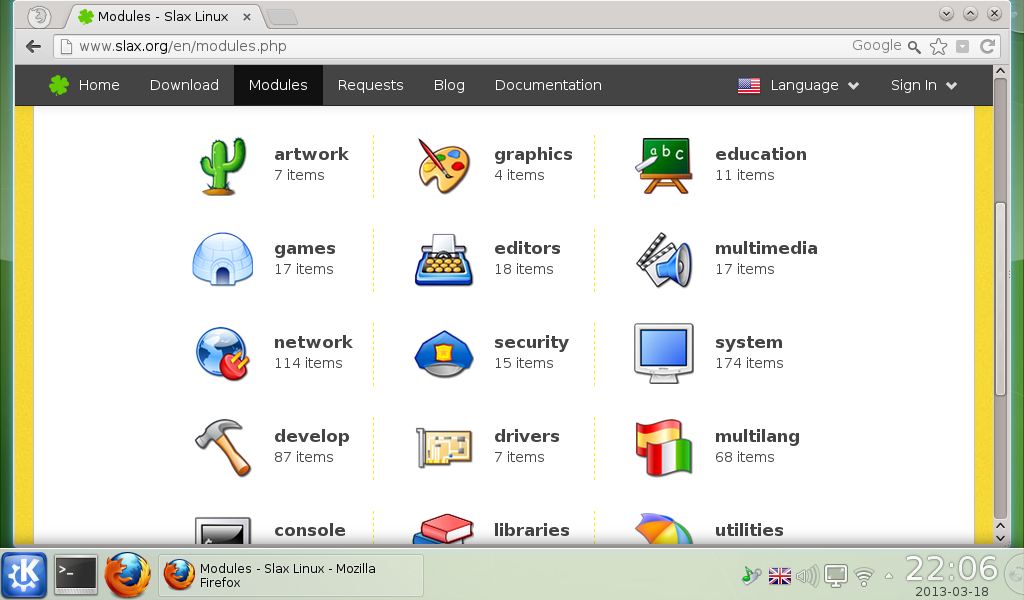How To Install Modules Slax
I will have to install big packages, OpenFOAM, BRLCAD, Code Aster, Dakota, etc, so. The tinier and more barebone is my minimal system, the more likely it is to fit everything into a DVD. Do modules in Slax load preserving stuff like $LD_LIBRARY_PATH, and $PATH so that if i type. Code: user@slax$. Hello everyone, and welcome to the unofficial list of which OSes work and which don't in Microsoft Virtual PC 2004. I hope this site helps you!


Light Linux with Slax Introduction is a very light, multilingual Linux distribution based on Slackware. This article is based on release 7.0.5. Information Persistent changes are no longer made in /slax/changes/ but rather /live/memory/changes Slax modules/bundles are rebuilt Slackware packages If you need to save a file onto the USB keydrive while running Slax, save it in /mnt/live/memory/. Temp Things to do Install Slax on hard drive Linux We'll assume the hard drive is empty, so there's no need to multiboot to Windows: • Boot Slax from a USB keydrive • Create and format a Linux partition on the hard drive (eg.
Mkfs.ext4 /dev/sda1; '. Is not a block special device.' Means the partition should be unmounted before formatting) • From the Slax site, download the ZIP file, and unzip into the partition (eg.
Wget -c cd /mnt/sda1; unzip slax-French-7.0.5-i486.zip) • Cd to /slax/boot, and run bootinst.bat (not bootinst.sh?), which will install Grub in the MBR • Reboot while removing the USB keydrive Windows Slax doesn't require a Linux partition. The contents of its ZIP file can be unzipped in an NTFS partition. Grub4dos will take care of booting up Slax without making changes to the MBR.
• • • • • • • Kitty: Change colors for man pages Error installing Chrome through Software Center Booted from USB keydrive >Software Center. 'Error mounting of the bundle, perhaps corrupted download' Tried again: 'Slax bundle is already active as 2230-chrome.sb'. Rebooted, 'Slax bundle is already active as 2230-chrome.sb' but found in KDE Internet menu. Switch between FR and US-EN interface 'US English' is included in all releases of Slax, even if you installed a different release. Go into KDE's System Configuration >Localization, click on the Languages tab, add US-EN to 'Prefered Languages', and reboot. How to remove a module (eg. Firefox) entirely?
The orthodox way is to run 'slax info', followed by 'slax deactivate '. If it fails because the app has some process running, just remove the.sb file located under /mnt/live/memory/data/slax/, and reboot. Before removing Firefox, be aware that Software Center relies on it. Load all mass storage devices (HD partitions + external drives) Just add a script in /etc/rc.d/rc3.d/: #!/bin/bash /usr/libexec/udisks-daemon & /usr/libexec/polkitd & More infos: • HAL: Deprecated, replaced in KDE4 with udisks (releases 1 and 2, which can be installed side-by-side); udisks is 'essentially [.] an abstraction for enumerating disk and storage devices and performing operations on them. Udisks provides: • A daemon (udisks-daemon) that implements well-defined D-Bus interfaces that can be used to query and manipulate disk and storage devices. • A command-line tool (udisks), that can be used to query and use the daemon Actions that a user can perform using udisks can be restricted using PolicyKit. Udisks relies on the kernel and udev where possible but does poll devices which do not publish their own details.
Typically a DVD device is polled. ('Introduction to Udisks', Finnbarr P.
Murphy) • udev: udev manages device nodes in /dev; successor of devfs and hotplug; was merged in 2012 into systemd • systemd: replacement for sysvinit/Upstart to manage daemons; systemd-logind should be referenced in /etc/pam.d. The display manager should support systemd. • ConsoleKit: used by systems that rely on upstart instead of systemd; Hence, not used in Slax • PolicyKit = Provides way for non-privileged processes to communicate with privileged ones; hosted by the project; udisks uses PolicyKit for authorization • D-Bus: IPC; Replaced DCOP in KDE 4; Works with Unix sockets; Automatically enabled when using systemd, since it relies on D-Bus Daemons such udisks or polkit can either be started by systemd at boot time or at session time by the display manager through D-Bus. Is a device integration framework for KDE 4; relies on udev/systemd.' # solid-hardware list QStringList Solid::Backends::UDisks::UDisksManager::allDevicesInternal() error: 'org.freedesktop.DBus.Error.ServiceUnknown' virtual QStringList Solid::Backends::UPower::UPowerManager::allDevices() error: 'org.freedesktop.DBus.Error.ServiceUnknown' # udisks --dump it is up to the distribution itself to ensure that UDisks is launched either before KDE is started - or is able to start itself automatically (via D-Bus autolaunching).
KDE Menu >Applications >System >System Setting >Hardware >Removeable Media >Check 'Enable automatic mounting of removeable media' On Login / Once mounted + check all the items in the two columns (!), reboot. DOESN'T WORK: Works when booting off hard drive 'udisks provides an interface to enumerate storage devices and perform operations on them. Any application can access the org. Download Free My Heb Rx Rewards Platinum Program Software. freedesktop.UDisks service on the system message bus.